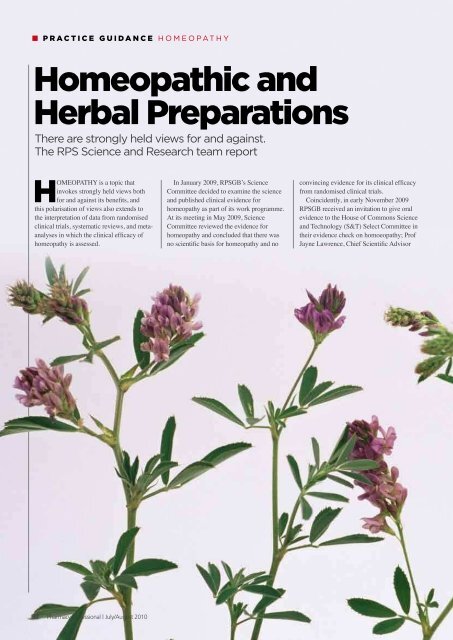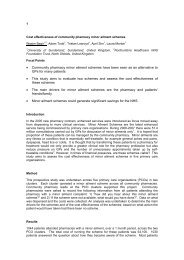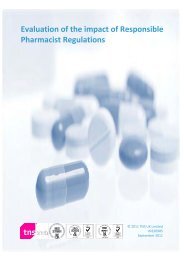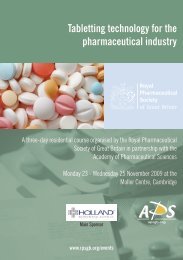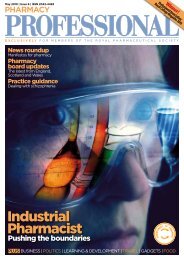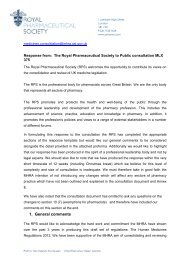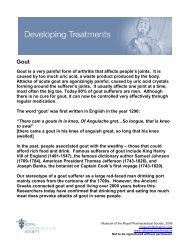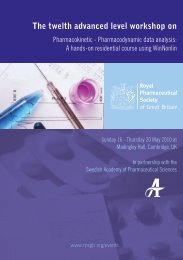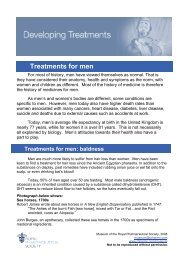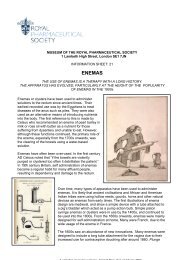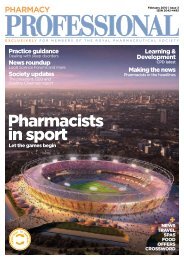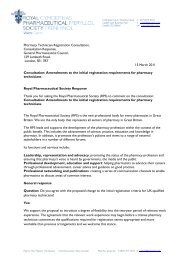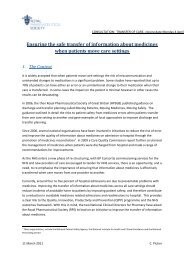victorian Pharmacy - Royal Pharmaceutical Society
victorian Pharmacy - Royal Pharmaceutical Society
victorian Pharmacy - Royal Pharmaceutical Society
Create successful ePaper yourself
Turn your PDF publications into a flip-book with our unique Google optimized e-Paper software.
p r a c t i c e g u i d a n c e h o m e o p at h y<br />
Homeopathic and<br />
Herbal Preparations<br />
There are strongly held views for and against.<br />
The RPS Science and Research team report<br />
HoMEoPATHy is a topic that<br />
invokes strongly held views both<br />
for and against its benefits, and<br />
this polarisation of views also extends to<br />
the interpretation of data from randomised<br />
clinical trials, systematic reviews, and metaanalyses<br />
in which the clinical efficacy of<br />
homeopathy is assessed.<br />
In January 2009, RPSGB’s Science<br />
Committee decided to examine the science<br />
and published clinical evidence for<br />
homeopathy as part of its work programme.<br />
At its meeting in May 2009, Science<br />
Committee reviewed the evidence for<br />
homeopathy and concluded that there was<br />
no scientific basis for homeopathy and no<br />
convincing evidence for its clinical efficacy<br />
from randomised clinical trials.<br />
Coincidently, in early November 2009<br />
RPSGB received an invitation to give oral<br />
evidence to the House of Commons Science<br />
and Technology (S&T) Select Committee in<br />
their evidence check on homoeopathy; Prof<br />
Jayne Lawrence, Chief Scientific Advisor<br />
presented the RPSGB’s oral evidence late<br />
November 2009. To support the RPSGB’s<br />
oral evidence, written evidence was prepared<br />
by the RPSGB’s Science and Research team<br />
which drew heavily from the work of, and<br />
external expertise available on, Science<br />
Committee (http://www.rpsgb.org.uk/pdfs/<br />
homeopathyRPSGBrespHoC.pdf).<br />
Placebo effect<br />
The House of Commons S&T Select<br />
Committee published its findings on its<br />
evidence check on homeopathy in February<br />
2010 (http://www.publications.parliament.uk/<br />
pa/cm200910/cmselect/cmsctech/45/45.pdf)<br />
and reported that the evidence base shows<br />
that homeopathy is not efficacious beyond<br />
the placebo effect, and that explanations<br />
for why homeopathy would work are<br />
scientifically implausible. The report also<br />
concluded that further clinical trials of<br />
homeopathy could not be justified, that the<br />
NHS should stop funding homeopathy, and<br />
that the Medicines and Healthcare products<br />
Regulatory Agency (MHRA) should not<br />
allow homeopathic product labels to make<br />
medical claims without evidence of efficacy.<br />
Indeed as homeopathic products are not<br />
medicines, the Committee suggested they<br />
should not be licensed by the MHRA. The<br />
evidence submitted by RPSGB agreed with<br />
the majority of the findings of the House of<br />
Commons S&T Committee.<br />
In advance of the publication of the<br />
Science and Technology Committee’s<br />
report on homeopathy, RPSGB’s Science<br />
and Research team prepared Advice for<br />
Pharmacists on Homeopathic and Herbal<br />
Products (http://www.rpsgb.org.uk/pdfs/<br />
homeoherbalprodadviceforpharmacists.pdf)<br />
that included information to support and<br />
prepare pharmacists for enquiries likely to<br />
be received from the public regarding media<br />
reports of the S&T committee findings.<br />
This document was based on the main<br />
recommendations in the House of Commons<br />
report together with what is considered to be<br />
good pharmacy practice.<br />
This concept goes<br />
against scientific<br />
understanding of<br />
how medicines act<br />
at a molecular level<br />
Whilst the RPSGB does not endorse<br />
homeopathy as a form of treatment,<br />
it does accept that patient choice is<br />
important and realises that patients often<br />
turn to complementary medicines, such<br />
as homoeopathy, when conventional<br />
medicine has been unable or unsuccessful in<br />
controlling disease or symptoms.<br />
When reviewing the literature for<br />
homeopathy and other complementary<br />
medicines for the Science Committee<br />
meeting in September 2009, several<br />
references noted that the public frequently<br />
confuse homeopathy with herbal medicine, a<br />
situation with which many pharmacists will<br />
be familiar. This confusion is most probably<br />
a consequence of homoeopathic products<br />
often being derived from herbs and called<br />
by their botanical name e.g. both herbal<br />
and homoeopathic preparations prepared<br />
using aloe will be called aloe, and because<br />
a single manufacturer may produce both<br />
homoeopathic and herbal products.<br />
Homoeopathy is a holistic complementary<br />
therapy based on three main principles,<br />
namely that like cures like, the minimal<br />
dose, and the use of a single medicine.<br />
Homeopaths believe that the more dilute<br />
a homeopathic product, the more potent<br />
it becomes, and that this potentisation<br />
requires a series of dilution and succussion<br />
stages. This concept goes against scientific<br />
understanding of how medicines act at a<br />
molecular level. While most homeopathic<br />
preparations are highly diluted, or ultradilute,<br />
some preparations can be of low dilution,<br />
giving them compositions similar to herbal<br />
preparations.<br />
Herbal medicine is the use of plant remedies<br />
in the treatment of disease, and many currently<br />
used conventional medicines have their origins<br />
in herbal preparations and plant materials.<br />
Herbal medicines subscribe to dose-response<br />
pharmacology where the biological response<br />
varies in direct proportion to the dose or<br />
concentration of the remedy.<br />
Prescription<br />
Thus, the main difference between herbal<br />
and homoeopathic preparations is that with<br />
herbal medicines, increasing the dose would<br />
be expected to increase the therapeutic<br />
effect, while for homoeopathic products, the<br />
more the preparation is diluted, the greater<br />
the effect homeopaths expect the product to<br />
have. In addition, homeopaths believe the<br />
dilution and succussion steps involved in the<br />
preparation of a homoeopathic product are<br />
critical to the effectiveness of the preparation.<br />
Furthermore, due to the different philosophies<br />
used in selecting a treatment for a condition,<br />
it would be reasonably expected that herbal<br />
and homoeopathic preparations could not be<br />
used to treat the same condition, although this<br />
is not always the case in practice.<br />
The differences between homeopathic and<br />
herbal preparations are described in a table in<br />
the Advice for Pharmacists on Homeopathic<br />
and Herbal Products guidance document on<br />
the RPSGB website. Examples of differences<br />
include how a particular product is selected,<br />
how the dose affects the efficacy of the<br />
remedy, the safety of the products and their<br />
potential side effects, whether they are<br />
likely to interact with prescription or other<br />
medicines, and whether they are safe to take<br />
in pregnancy or while breastfeeding.<br />
In the future, and based on the findings of<br />
the House of Commons Select Committee<br />
report on homeopathy, RPSGB would<br />
support approaching the MHRA regarding<br />
the labelling and licensing of herbal and<br />
homeopathic products, to strive for the<br />
removal of indications from homeopathic<br />
products, and to ensure labelling makes the<br />
difference between herbal and homeopathic<br />
products clear, all of which would help in<br />
ensuring the public understand the differences<br />
between herbal and homeopathic products. n<br />
l For a quick reference guide go to<br />
www.rpharms.com<br />
32 <strong>Pharmacy</strong> Professional | July/August 2010 July/August 2010 | <strong>Pharmacy</strong> Professional 33


